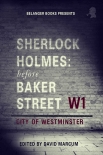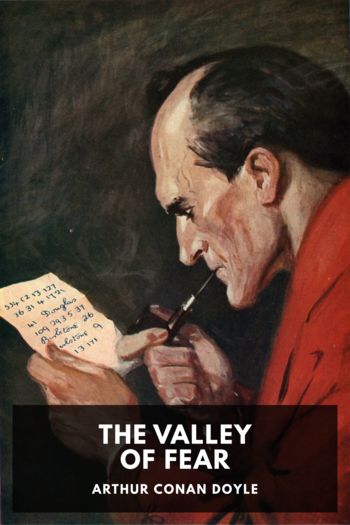Sherlock Holmes: Before Baker Street by David Marcum (books to read to be successful TXT) 📗

- Author: David Marcum
Book online «Sherlock Holmes: Before Baker Street by David Marcum (books to read to be successful TXT) 📗». Author David Marcum
Escott had begun his acting career in 1879 by joining the Shakespearian Company of Michael Sasanoff. And yet, though boasting of having performed with such theatrical giants as Sir Henry Irving and Sir Max Beerbohm Tree, he confessed to never having truly considered the stage as his calling. In point of fact, at age twenty-five, he had begun to envision his future not as an actor, but rather (in his words) as a “consulting detective” – “the world’s first,” he hastened to add.
For Escott, acting served only as necessary preparation. “There is no better way of seeing through a disguise,” he announced, “than being able to assume one.” Without having as his goal a career on the stage, he remained generally content – especially in the beginning – with small parts like the first or second “walking gentleman” – or even “low comedian”. For Escott, impersonation was the thing – learning the tricks of make-up and costume to appear convincingly in the persona of someone other that oneself.
In the early spring of ‘79, “Old Sasanoff” (as he was called) informed the actors that he had arranged for the company a lengthy tour of America. Beginning in November, they were to spend a short time in New York City, proceed to Chicago, and then travel west. To Escott, such a trip posed more than the simple opportunity to further his acting skills. To him, the trip provided the perfect opportunity for familiarising himself with American life.
“I’d heard New York City described as ‘The Modern Gomorrah’,” he told me, “and I wanted to know why. I needed more time there than Sasanoff was offering.”
Although he never explained how he intended to go about it, Escott envisioned the metropolis as the perfect spot to examine the full range of criminal behaviours. As a consequence, having no central roles to perform in London, he asked Sasanoff if he might leave for America well before the others in the troupe and re-join them once they arrived in the fall. Apparently, Sasanoff liked Escott’s work well enough and, save for the muttering about the need to find a replacement, agreed to rehire him upon reaching New York. In August, therefore, William Escott sailed for the United States.
Despite his inexpensive lodgings near Broadway, it did not take Escott long to consume most of the money he had set aside for his adventure, and he realized the need to find employment if he was to fend off starvation before November when the Sasanoff company was scheduled to arrive. As luck would have it, during a sightseeing venture to Booth’s Theatre, he discovered that not only was a Robinson Crusoe panto about to be mounted by the Watley Players, a visiting group from England under the direction of Malcolm Watley, but also that the company stood in need of additional actors.
“Robinson Crusoe contains a number of stock characters,” Escott explained, “the ship’s crew, villagers, pirates, immortals, and the like – and the company required additional players to round out the large cast.”
Upon seeing the advertisement, Escott applied to Watley himself and, thanks in equal parts to the actor’s British upbringing and his theatrical experience, was immediately hired. In keeping with the tradition of the pantomime, he was to play the part of sea cook, pirate, and one-legged man all rolled into one.
Silly though the panto may have been, it was thanks to that production of Robinson Crusoe that Escott learned how to contort not only his face, but also his body. To appear to be missing a limb, he was fitted with a leather, belt-like harness that kept his right-leg pulled up behind him. Connected to the harness was the wooden-leg itself, its shallow, concave top serving as a small platform for supporting his right knee. A skirt-like coat concealed all of this paraphernalia but the peg-leg, and Escott said it didn’t take long to get used to hobbling about. Indeed, he came to like the illusion, but once a performance ended, he admitted no hesitation in removing the harness and stretching out his liberated limb.
Booth’s Theatre provided a brief respite from the weather, but not a complete one. At the performance Jones and I attended that Sunday evening, not only could you hear the rain pummelling the theatre’s roof, but you could also look round the auditorium and see the countless empty seats. And yet, as Lucretius tells us, Ut quod ali cibus est aliis fuat acre venemum. [One’s man’s meat is another man’s poison.] Safely ensconced inside the theatre, Jones and I were not complaining. On the contrary, once the gaslights were turned down, the scarcely-populated hall allowed the two of us the opportunity to improve our seating.
The performance offered much diversion full of action, song, and dance. But through it all, the audience kept a collective eye on the minor role played with gusto by Escott. With a ridiculous wooden parrot of emerald green attached to his shoulder, the actor would convincingly thump his way across the stage, eagerly flip into the air stage-prop pancakes made of cloth, and menacingly utter fierce growls whilst brandishing an ominous blade.
So fearsome an aspect did Escott project (in spite of the silly parrot) that members of the audience would shout out to warn the innocent Robinson Crusoe, “Hist! There he is!” and “Be careful!” Such calls were particularly easy to distinguish in the half-empty hall, and Robinson Crusoe, played by a young lady, would flit away in the nick of time. As a consequence, the sea-cook and the rest of the pirates, supposedly motivated by drink, broke into some sort of garbled song-and-laboured-dance about the evils they planned to perform the next time they caught up to Crusoe – something about a number of sailors on a “Dead man’s chest” and a refrain of “Yo ho ho and barrels of rum”. Of course, the audience, however depleted, loved it.
As did Jones and





Comments (0)